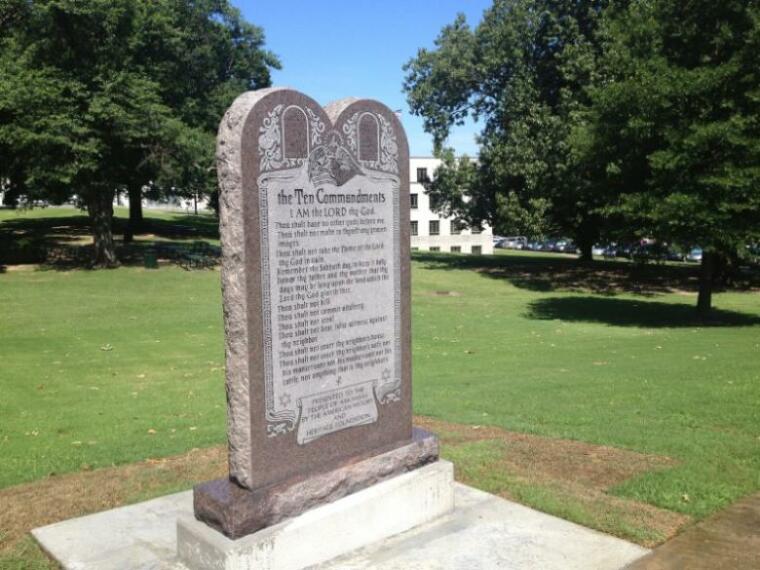Court finds man who destroyed Ten Commandments monument unfit to stand trial

A court has determined that the man who was charged with destroying a Ten Commandments monument in Arkansas earlier this year was mentally unfit to stand trial.
On Thursday, Circuit Judge Chris Piazza had decided that Michael Tate Reed was unfit to proceed based on the diagnosis of state doctors and ordered him committed to a state hospital to determine if he will ever be fit to stand trial.
Reed, 32, crashed a vehicle into the privately funded Decalogue display outside the Arkansas Capitol building on June 28, less than 24 hours after it was installed. He faced a felony criminal mischief charge for destroying the monument.
According to The Associated Press, he was also arrested in 2014 for destroying a Ten Commandments monument in Oklahoma. Prosecutors declined to file criminal charges against him that time, but he was referred to mental health treatment.
Reed's relatives noted that he has been diagnosed with schizoaffective disorder, which can cause hallucinations, delusions, disorganized thinking and manic behavior.
"We met him in jail. He's a very sick person, and this is the right outcome," said Robert Hodge, an attorney for Reed.
In a live video on Facebook, Reed was heard yelling "freedom" as he crashed a vehicle into the monument outside the Capitol building.
He had reportedly posted another video in which he stated that he is a proponent of the separation of church and state and feels that "[t]here's no one religion government should support."
In July, Reed admitted to reporters that he has been diagnosed with mental illnesses that include schizophrenia and bipolar disorder, but insisted that he is not "mentally insane."
"I meant to do it, fully well," he said, referring to his act. "I did it because I fully believe I'm the rider on the first white horse in Revelations," he added.
AP noted that the monument destroyed by Reed was a replica of a Ten Commandments display at the Texas Capitol that was upheld by the U.S. Supreme Court in 2005.
The lawmaker who introduced a 2015 measure that allows the privately funded monument to be placed on Capitol grounds said that a replacement has already been made, but did not disclose when it will be installed.
A spokesman for the secretary of state's office said the new monument will undergo another review by the Capitol Arts and Grounds Commission to determine if there are any changes or additions from the original display. Several groups have expressed plans to sue for state endorsement of religion after the monument is in place.
 Christians don't have to affirm transgenderism, but they can’t express that view at work: tribunal
Christians don't have to affirm transgenderism, but they can’t express that view at work: tribunal Archaeology discovery: Medieval Christian prayer beads found on Holy Island
Archaeology discovery: Medieval Christian prayer beads found on Holy Island Presbyterian Church in America votes to leave National Association of Evangelicals
Presbyterian Church in America votes to leave National Association of Evangelicals Over 50 killed in 'vile and satanic' attack at Nigerian church on Pentecost Sunday
Over 50 killed in 'vile and satanic' attack at Nigerian church on Pentecost Sunday Ukrainian Orthodox Church severs ties with Moscow over Patriarch Kirill's support for Putin's war
Ukrainian Orthodox Church severs ties with Moscow over Patriarch Kirill's support for Putin's war Islamic State kills 20 Nigerian Christians as revenge for US airstrike
Islamic State kills 20 Nigerian Christians as revenge for US airstrike Man who served 33 years in prison for murder leads inmates to Christ
Man who served 33 years in prison for murder leads inmates to Christ


 Nigerian student beaten to death, body burned over ‘blasphemous’ WhatsApp message
Nigerian student beaten to death, body burned over ‘blasphemous’ WhatsApp message 'A new low': World reacts after Hong Kong arrests 90-year-old Cardinal Joseph Zen
'A new low': World reacts after Hong Kong arrests 90-year-old Cardinal Joseph Zen Iran sentences Christian man to 10 years in prison for hosting house church worship gathering
Iran sentences Christian man to 10 years in prison for hosting house church worship gathering French Guyana: Pastor shot dead, church set on fire after meeting delegation of Evangelicals
French Guyana: Pastor shot dead, church set on fire after meeting delegation of Evangelicals ‘Talking Jesus’ report finds only 6% of UK adults identify as practicing Christians
‘Talking Jesus’ report finds only 6% of UK adults identify as practicing Christians Mission Eurasia ministry center blown up in Ukraine, hundreds of Bibles destroyed: 'God will provide'
Mission Eurasia ministry center blown up in Ukraine, hundreds of Bibles destroyed: 'God will provide' Church holds service for first time after ISIS desecrated it 8 years ago
Church holds service for first time after ISIS desecrated it 8 years ago Burger King apologizes for 'offensive campaign' using Jesus' words at the Last Supper
Burger King apologizes for 'offensive campaign' using Jesus' words at the Last Supper Uganda: Muslims abduct teacher, burn him inside mosque for praying in Christ’s name
Uganda: Muslims abduct teacher, burn him inside mosque for praying in Christ’s name